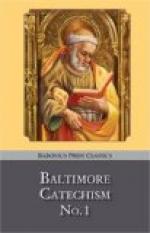296. Q. Why do we make the sign of the Cross? A. We make the sign of the Cross to show that we are Christians and to profess our belief in the chief mysteries of our religion.
297. Q. How is the sign of the Cross a profession of faith in the chief mysteries of our religion? A. The sign of the Cross is a profession of faith in the chief mysteries of our religion because it expresses the mysteries of the Unity and Trinity of God and of the Incarnation and death of our Lord.
298. Q. How does the sign of the Cross express the mystery of the Unity and Trinity of God? A. The words, In the name, express the Unity of God; the words that follow, of the Father, and of the Son, and of the Holy Ghost, express the mystery of the Trinity.
299. Q. How does the sign of the Cross express the mystery of the Incarnation and death of our Lord? A. The sign of the Cross expresses the mystery of the Incarnation by reminding us that the Son of God, having become man, suffered death on the cross.
300. Q. What other sacramental is in very frequent use? A. Another sacramental in very frequent use is holy water.
301. Q. What is holy water? A. Holy water is water blessed by the priest with solemn prayer to beg God’s blessing on those who use it, and protection from the powers of darkness.
302. Q. Are there other sacramentals besides the sign of the Cross and holy water? A. Besides the sign of the Cross and holy water there are many other sacramentals, such as blessed candles, ashes, palms, crucifixes, images of the Blessed Virgin and of the saints, rosaries, and scapulars.
LESSON TWENTY-EIGHTH ON PRAYER
303. Q. Is there any other means of obtaining God’s grace than the Sacraments? A. There is another means of obtaining God’s grace, and it is prayer.
304. Q. What is prayer? A. Prayer is the lifting up of our minds and hearts to God to adore Him, to thank Him for His benefits, to ask His forgiveness, and to beg of Him all the graces we need whether for soul or body.
305. Q. Is prayer necessary to salvation? A. Prayer is necessary to salvation, and without it no one having the use of reason can be saved.
306. Q. At what particular times should we pray? A. We should pray particularly on Sundays and holydays, every morning and night, in all dangers, temptations, and afflictions.
307. Q. How should we pray? A. We should pray: 1st, With attention; 2d, With a sense of our own helplessness and dependence upon God; 3d, With a great desire for the graces we beg of God; 4th, With trust in God’s goodness; 5th, With perseverance.
308. Q. Which are the prayers most recommended to us? A. The prayers most recommended to us are the Lord’s Prayer, the Hail Mary, the Apostles’ Creed, the Confiteor, and the Acts of Faith, Hope, Love, and Contrition.
309. Q. Are prayers said with distractions of any avail? A. Prayers said with wilful distractions are of no avail.




